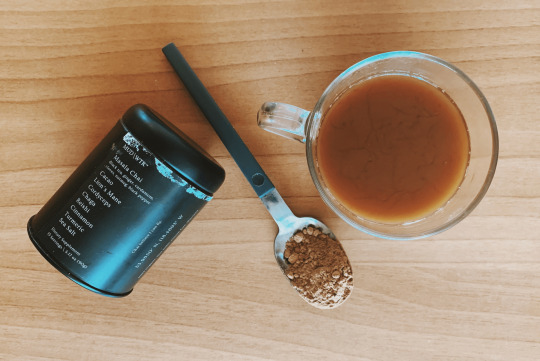Don't wanna be here? Send us removal request.
Text
Coffee - Mud Wtr Review
Tea is arguably the most popular natural coffee alternative because there’s a wide variety of caffeinated and caffeine-free teas to choose from. But the problem with tea is that it tastes nothing like coffee, which makes it an unattractive alternative for someone who likes the taste and flavor of real coffee, see the result of MUD WTR Review.
Some smart brands have seized that opportunity and launched beverages that fill the gap between coffee and tea. MUD\WTR is one of those coffee alternatives, and I had an opportunity to test it over the past few weeks.

MUD WTR Review
MUD WTR is a coffee alternative that’s made out of organic spices (you can find a complete list of ingredients below). It has only one-seventh of the caffeine of coffee and claims to give you natural energy and increase your focus without the jitters and crash that some people experience after drinking regular coffee.
Pros
Attractive taste and flavor.
100% organic ingredients.
Eco-friendly (reusable and recyclable) packaging.
Offers a lasting boost of energy without the jitters and crash.
Paired with an MCT-oil creamer, MUD WTR can be turned into a creamy latte.
Whole30 approved, vegan, kosher and certified gluten-free.
Ingredients
Depending on where you stand on the dietary spectrum (vegan, paleo or carnivore), you might consider MUD\WTR to be either the healthiest product on the planet or you might have reservations.
Without getting into a vegan vs. carnivore argument (I’ll reserve that for a future blog post), I’ll be up-front and tell you that I follow a predominantly animal-based diet. That means I consume a lot of animal meat and fat (including organ meat), paired with the least-toxic plant foods available, such as avocados, sweet fruits and certain (deseeded and peeled) veggies.
Most of MUD\WTR’s ingredients don’t fall into the “least-toxic” category — but neither do those of coffee, as discussed earlier in the article. So let’s talk about the ingredients in MUD\WTR before I give you my assessment and interpretation of their relative toxicity.
The primary ingredient in MUD WTR Review is masala chai, a black tea made with spices including organic ginger, organic cardamom, organic cloves, organic nutmeg and organic black pepper.
Additionally, MUD\WTR contains organic cacao, organic lion’s mane, organic chaga, organic cordyceps, organic reishi (all of which are adaptogenic mushrooms/funguses), organic cinnamon, organic turmeric and Himalayan salt.
Some people have labeled MUD\WTR a “mushroom coffee.” While that might sound odd, I think it’s a fair description considering that the good portion of the powder is made up of mushrooms.

Taste and Texture
When I started drinking coffee many years ago, I didn’t actually drink coffee. I drank beverages that had coffee but also other things that masked the taste of what should have been the primary ingredient. I’m talking about milk, sugar and other ingredients that would help tweak the beverage’s flavor to my liking.
If you’re among those who enjoy flavored coffee rather than black coffee, I think there is a much higher likelihood that you’ll enjoy the taste of MUD\WTR.
When I took my first sip of this coffee alternative, I immediately thought about wintertime. That’s because of the subtle notes of cocoa, cinnamon and nutmeg that I strongly associate with the colder months of the year. In other words, MUD\WTR tastes like a Christmas-inspired latte without the overwhelming sweetness you might be used to (if you buy your lattes from Starbucks, that is).
As far as the texture is concerned, MUD WTR Review tastes earthy and gritty. That’s because not all of the powder completely dissolves in the water. If I had to guess, that’s where the product name (mud water) comes from. Overall, I really like both the taste and the texture — especially in the context of a flavored, caffeinated beverage.
1 note
·
View note